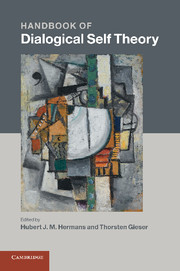
-
Select format
-
- Publisher:
- Cambridge University Press
- Publication date:
- June 2012
- November 2011
- ISBN:
- 9781139030434
- 9781107006515
- 9781107681064
- Dimensions:
- (228 x 152 mm)
- Weight & Pages:
- 0.93kg, 518 Pages
- Dimensions:
- (229 x 152 mm)
- Weight & Pages:
- 0.69kg, 518 Pages
- Subjects:
- Social Psychology, Psychology
You may already have access via personal or institutional login- Subjects:
- Social Psychology, Psychology
Book description
In a boundary-crossing and globalizing world, the personal and social positions in self and identity become increasingly dense, heterogeneous and even conflicting. In this handbook scholars of different disciplines, nations and cultures (East and West) bring together their views and applications of dialogical self theory in such a way that deeper commonalities are brought to the surface. As a 'bridging theory', dialogical self theory reveals unexpected links between a broad variety of phenomena, such as self and identity problems in education and psychotherapy, multicultural identities, child-rearing practices, adult development, consumer behaviour, the use of the internet and the value of silence. Researchers and practitioners present different methods of investigation, both qualitative and quantitative, and also highlight applications of dialogical self theory.
Reviews
'This is an incredibly engaging and comprehensive text that builds on the evolving dialogical self theory, applies the model to several fascinating and diverse global cases and still finds room to explain in thoughtful detail how to utilize these ideas in improving people’s lives. What you have in the Handbook of Dialogical Self Theory is a comprehensive guide to the theoretical understanding, analysis, and practice of dialogical self theory with diverse case examples and multiple illustrations of its usefulness and practicality in a complex and changing world.'
Jack S. Kahn - California School of Professional Psychology, Alliant International University
‘This is a truly comprehensive examination of the multiple and diverse aspects of the emerging field of dialogical self studies. From a theoretical, methodological and practical vantage point an international group of scholars lays out the promises and possibilities of what will surely become an exciting field of inquiry as well as a foundation for new practices.’
Henderikus J. Stam - University of Calgary
‘The 'dialogical self' is among the most important and original new theories in the social sciences in the past 20 years. It is a theory for our times, addressing in complex and insightful ways the ways that globalization affects psychological functioning. In this book, the theory is presented lucidly and thoroughly, covering an impressive range not only in psychology but also sociology, economics, philosophy, and political studies. The book should be welcome in all those fields as a major contribution to the understanding of globalization.’
Jeffrey Jensen Arnett - Clark University
‘Longing for a 'big picture' look at dialogical self theory? Look no further! Besides providing detailed examinations of the theory itself, this handbook presents a plethora of ways to apply DST to research, psychotherapy, and education. DST scholars and practitioners will not be disappointed!’
Jonathan D. Raskin - State University of New York
'Handbook of Dialogical Self Theory is a comprehensive consolidation of recent advances in the theory and practice of dialogical self theory (DST). The collection of 27 chapters provides a comprehensive explication of DST as a 'bridging theory' … the handbook provides an excellent resource upon which further innovative theoretical, research, and practical positions should be built. More important, readers who engage with the content will be changed by it: never again will you use phrases like 'sense of self' without feeling that someone, somewhere has something very different and important to say on the matter.'
Gavin Sullivan Source: PsycCRITIQUES
'For those interested in DST, Hermans and Gieser’s volume is a valuable and important contribution to the literature. And for those who are just curious and want to know more, they too will be rewarded. It is a rich, comprehensive compendium featuring many of the central players in the DST movement and it explores the idea of the dialogical self with a kind of earnestness and sense of purpose that many will find appealing.'
Mark Freeman Source: Theory and Psychology
'The editors of this work are among the leading representatives of narrative psychology and creators of dialogical self theory (DST) … Of particular value is the fact that the authors represented are from Africa, India, Japan and China, in addition to traditional, Western centers of science … [This volume] merits use as an academic textbook on DST [and] … will interest 'humanists', including anthropologists, linguists, sociologists, psychologists, psychotherapists, psychiatrists, doctors and even business psychologists … Authors of individual chapters use a clear and lively style, so the concepts described will interest even those readers unfamiliar with the topic.'
Mariusz Wołońciej Source: International Journal for Dialogical Science
Contents
Metrics
Altmetric attention score
Full text views
Full text views help Loading metrics...
Loading metrics...
* Views captured on Cambridge Core between #date#. This data will be updated every 24 hours.
Usage data cannot currently be displayed.
Accessibility standard: Unknown
Why this information is here
This section outlines the accessibility features of this content - including support for screen readers, full keyboard navigation and high-contrast display options. This may not be relevant for you.
Accessibility Information
Accessibility compliance for the PDF of this book is currently unknown and may be updated in the future.


